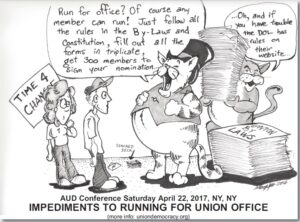 I agree with Lois Weiner (writing in the Winter 2021 issue) that democracy in a union has to be linked to a program that will generate enthusiasm and which is “transitional” toward some greater militancy and political/social influence. As I recall Benson not only liked the AFT but also thought the UAW just fine because those unions had formally democratic structures. People were not getting murdered, at the least. I also appreciated the research the author has done, going way back to those New Politics issues of 55 years ago and more. Readers may find my recent piece on the UAW for Labor Notes suggests similar concerns.
I agree with Lois Weiner (writing in the Winter 2021 issue) that democracy in a union has to be linked to a program that will generate enthusiasm and which is “transitional” toward some greater militancy and political/social influence. As I recall Benson not only liked the AFT but also thought the UAW just fine because those unions had formally democratic structures. People were not getting murdered, at the least. I also appreciated the research the author has done, going way back to those New Politics issues of 55 years ago and more. Readers may find my recent piece on the UAW for Labor Notes suggests similar concerns.
One does not have to be a socialist or revolutionary or Third Camper to link a program of democracy to that of progressive social change. Nor to see the unions as part of a larger social movement which today is being led by BLM and Red State teacher strikes and socialist groups, like DSA. I think Benson was probably sectarian about union democracy per se, but then his ideas were forged in the years when the Workers Party and Labor Action were coming to an end and he was looking to democratize a labor movement that then seemed too enmeshed with the Democrats and the postwar state. To answer one of the questions the author poses, I don’t think today there should be any argument about unions or others on the left supporting progressive legislation from the “bourgeois” state. What are civil rights laws, after all? Or health and safety laws, and the like? That is an argument for a very different era, when C. Wright Mills and others were worried about labor incorporation into a warfare state.
And this does bring us to a kind of difference the author and I might have. When I think of the tasks before the labor movement, and even more so the left in general, I think not of how to shift the policy program of the AFT or even of SEIU, but of what it will take to organize Walmart and Amazon and now Google. True, a more democratic and robust labor movement would be attractive to the unorganized, but it would not be decisive. I think a combination of managerial repression endorsed de facto by the state is the biggest problem we face. And this does marginalize to a degree the issue of union democracy, at least in my political imagination. That was not true 50 years ago when I began writing about the CIO, but it is today. Yes, a really dramatic burst of rank and file militancy and organization, as with the Chicago teachers a few years back, can have a large impact on the unorganized, and maybe did a lot to bring us the Red State revolts, but for the most part union organizing today is just a hard slog and it needs a change in the labor law and more energy from existing unions and allies to get it done.


Leave a Reply